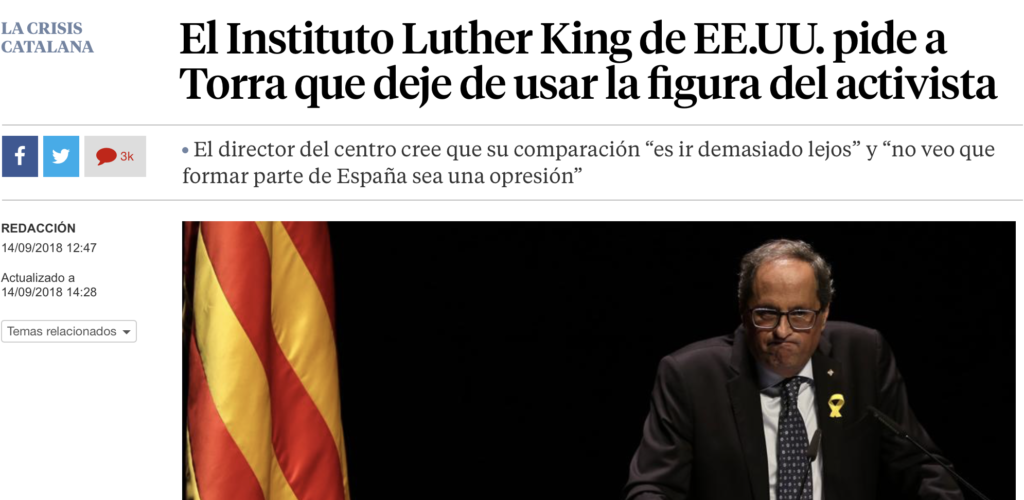18.09.2018 - 09:26
|
Actualització: 18.09.2018 - 11:26
In 1951, on the eve of the Algerian War of Independence and at the height of French nationalism, two heroes of journalism, two intellectual giants, met to talk about their profession. Jean Daniel and Albert Camus, the bravest of the brave, in an interview with the magazine Caliban, discussed journalism’s role in the outbreak of violence in Algeria. Camus pointed out a brutal truth that remains indisputable to this day: ‘a society that is willing to be distracted by a dishonoured press is only heading towards slavery.’
Today, Albert Camus and Jean Daniel are celebrated as two of the greatest intellectuals and journalists the world has known. But during those years of the struggle for Algerian independence, they were both attacked and persecuted for simply refusing to blindly follow the nationalist propaganda of the French state. By mediocre newspaper directors, whose names today no one recalls, who called them unprofessional. By colleagues in the profession, so blinded by the ideology that they were no longer able to see what was going on in the street. By blind, fanatical readers who didn’t realise that imperialist hatred was turning them into evil people. Camus, himself a child of pied-noirs, summed up the reason for such journalism and intellectual courage with a phrase that has been preserved for posterity and that, to this day, is adopted by many journalists such as myself as the guiding principle behind their life’s work: ‘I prefer to have my eyes open’. As simple as that, even if it means paying a high price.
This comes to mind in response to the controversy surrounding the Spanish nationalist mouthpiece El Confidencial’s interview with the director of the Martin Luther King Institute, Clayborne Carson. As soon as I saw the article’s headline last Friday, I knew there was no way Carson had made such a statement. I asked the editorial staff at VilaWeb to contact him to confirm my suspicions. However, a few hours later, Carson published an entry in his blog in which he expressed his outrage at the way in which his words had been distorted. Although El Confidencial is now attempting to put a spin on it and twist his words even further by presenting a partial audio of the interview, the reality is unquestionable. And hard to swallow. This is a great example of something from which we ought to draw conclusions, something from which our society ought to learn.
The problem as I see it is not that a newspaper like El Confidencial, which has consistently failed to abide by any professional ethics, has published a lie. The problem is that other media outlets have jumped on the bandwagon and that, as a consequence, the story has become factual. Newspapers such as La Vanguardia and El Periódico and the majority of Spanish press, enthusiastic supporters of state nationalism. And even TV3 [Catalonia’s public broadcaster]. None of them paused for a moment to ask themselves whether it were possible.
The problem is that it was obvious from the outset that what El Confidencial had published couldn’t possibly be true. Anyone who is at all familiar with the workings of the academic world in the United States knows that someone with a position like that of Clayborne Carson would never speak in an unguarded, frivolous manner about a topic they knew little about. It’s as simple as that. And something as simple as that ought to have meant any journalist would automatically mistrust the article. The shame of Spanish journalism is that —when it comes to thwarting the Catalan independence movement— it no longer possesses the necessary reflexes to think. It doesn’t even get suspicious when it sees an absurdity that logic dictates can’t possibly be true. It has lost its raison d’être, in other words, to inform, and it has embraced propaganda.
In his no-nonsense reply to El Confidencial, Clayborne Carson makes it clear that there are things that he is unsure of regarding the Catalan independence movement, as is to be expected, and which therefore he would like to know more about. But he also makes it clear that, for this very reason, he wouldn’t dare to make meaningless statements, unlike those unqualified snake-oil salesmen who the Spanish media are so willing to give a platform to. Ultimately, Carson reiterates his sympathy towards all those who choose to use non-violence and makes it clear that he would not dare to speak on behalf of Dr King about a topic he did not address in his lifetime. An honourable attitude, one so fundamental that it is shocking that there are those who are unable to understand it. However, Spanish journalism is already so degraded, so decadent, so intellectually cowardly and immoral that it fails to be governed by even the simplest guidelines. It would have been sufficient to think it rather odd that a person in his academic position would voice his opinions in such a care-free manner. That ought to have been a sufficient warning to proceed with caution and to wait and see if it was true before running off to intoxicate one’s readers. But it is seems as if nowadays something so simple is asking too much.
On 25 November 1939, Le Soir Républicain was due to publish an anonymous manifesto defending the freedom of the press. The article had been written by Albert Camus, one of only two journalists the newspaper had in Algiers, though eventually its publication did not go ahead due to censorship. Nevertheless, the original article was found many years later. And seen from today’s point of view, it is an important lesson that journalists in this country ought to keep in mind every morning when they get up. According to Camus, no pressure in the world can force our mind to cease to be honest, and that resisting is, above all, refusing to tell or spread lies. He ends by declaring that a free newspaper is measured both by what it says and the way it stays silent, when everyone around them is trying to manipulate the truth.
[An earlier version of this editorial did not include TV3 as one of the media outlets that reported on the story. Several people told me that they had done so, but I didn’t see it live and I was unable to find a video on the CCMA website that would allow me to prove that they had. After publishing this editorial, I have continued trying to locate the original source. However, colleagues at TV3 itself have finally been able to confirm that, although there was no video, the TV news presenters did run the story. Once it was confirmed, I subsequently added TV3 to the list. Some people feel that I ought to make it clear that TV3 wasn’t included in the earlier version but was added later. I am including this clarification in the current version as a result.]


